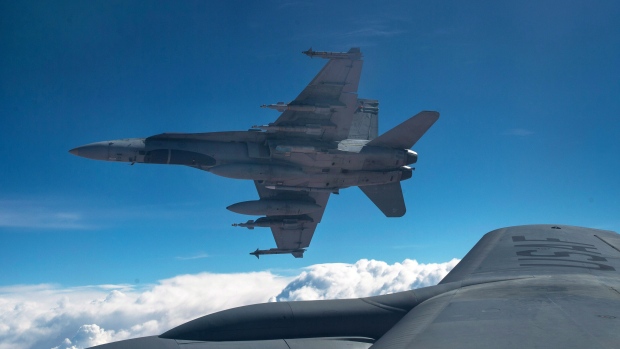“The Royal Canadian Air Force (RCAF) is launching an investigation into an incident involving an inappropriate call sign transmitted from one of its aircraft. On Monday, a CF-18 Hornet on a flight in the United Kingdom was broadcast globally with the call sign ‘D*CK69.’ This unexpected and unapproved change has sparked concern and raised questions about the circumstances behind it.
In a statement, an RCAF spokesperson acknowledged the incident and stated that they are aware of the inappropriate call sign transmitted by one of their CF-18 Hornets deployed to the United Kingdom. However, further details regarding the incident remain unknown as the investigation is ongoing.
The Blunder Goes Viral:
The blunder quickly gained attention online after being shared on social media platforms, particularly Twitter. Steffan Watkins, a user on Twitter, expressed astonishment and criticism about the incident. In a tweet, Watkins said, ‘In a globally publicly viewable demonstration of poor judgment and lack of situational awareness, a Royal Canadian Air Force pilot of a CF-188 Hornet seems to have set the plane’s Mode-S transponder to broadcast a callsign of #DICK69, rather than their assigned callsign of BLDE11.’ This tweet garnered significant attention, accumulating over 10,000 views within just six hours.
The Importance of Integrity and Professionalism:
The RCAF emphasized the importance of upholding high standards of integrity and professionalism in its statement. They expect all members of the RCAF to exercise good judgment at all times. This incident serves as a reminder that even small errors in judgment can have a significant impact and tarnish the reputation of the organization.
Unanswered Questions and Previous Incidents:
As of now, the inappropriate call sign is still displaying on flight tracking websites. The RCAF has not provided any further information about the circumstances surrounding the incident or the actions that will be taken as a result.
It is worth noting that this is not the first time that the RCAF has faced an incident involving offensive call signs. In 2022, two senior officers were reprimanded and received minor suspensions after assigning an offensive call sign to another pilot. These incidents raise concerns about the culture within the organization and the potential need for stronger measures to prevent such occurrences in the future.
Conclusion:
The unauthorized transmission of an inappropriate call sign from a Royal Canadian Air Force aircraft has sparked controversy and concern. As the investigation unfolds, it is essential to address the underlying issues that may have contributed to this incident. Upholding high standards of integrity, professionalism, and situational awareness is crucial for any organization, especially one as significant as the RCAF. This incident serves as a reminder that even small lapses in judgment can have far-reaching consequences. It is up to the RCAF to learn from this incident and take the necessary steps to ensure that such occurrences are prevented in the future.”
Reference















